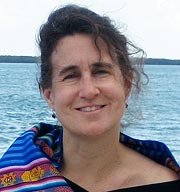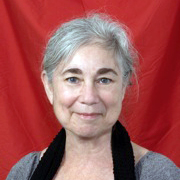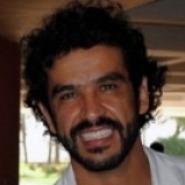August 5, 2010: Segment on the Environment: The Big Spill
Due to the April oil spill in the Gulf of Mexico, THT plans to have a segment dedicated to the environment. We are interested in having an informative and open exchange with museum visitors. Environmentalists, scientists and artist will share their knowledge to clarify doubts, propose possible solutions, and perhaps explain how the art community can get involved in the cleanup efforts and answer questions. Please listen to podcasts below.

Dr. Lora Fleming
Depts of Epidemiology & Public Health and Marine Biology & Fisheries
Miller School of Medicine and Rosenstiel School of Marine and Atmospheric Sciences.
As the only board certified Occupational and Environmental Medicine Physician and Epidemiologist in South Florida, I serve in an unique role at the University of Miami. My areas of research and teaching are Occupational and Environmental Medicine and Epidemiology. As the Co Director of the National Science Foundation (NSF)-National Institute of Environmental Health Sciences (NIEHS) University of Miami Oceans and Human Health Center (www.rsmas.miami.edu/groups/ohh/) and the Associate Director of the Florida International University (FIU)-University of Miami NIEHS ARCH Program (http://arch.fiu.edu/)
Depts of Epidemiology & Public Health and Marine Biology & Fisheries
Miller School of Medicine and Rosenstiel School of Marine and Atmospheric Sciences.
As the only board certified Occupational and Environmental Medicine Physician and Epidemiologist in South Florida, I serve in an unique role at the University of Miami. My areas of research and teaching are Occupational and Environmental Medicine and Epidemiology. As the Co Director of the National Science Foundation (NSF)-National Institute of Environmental Health Sciences (NIEHS) University of Miami Oceans and Human Health Center (www.rsmas.miami.edu/groups/ohh/) and the Associate Director of the Florida International University (FIU)-University of Miami NIEHS ARCH Program (http://arch.fiu.edu/)

Artist, Karen Rifas
Received her MFA from the University of Miami and presently teaches at Miami-Dade College and New World School of the Arts. Awards include the 2005 South Florida Consortium Fellowship and Florida Visual Arts fellowship. 2004-5 one person shows include Polk Museum of Art, Edison College and Berenice Steimbaum Gallery. Recent installations were exhibited at the Lowe Art Museum and the Museum of Art, Ft. Lauderdale, Abandoned, a site specific installation at De La Cruz contemporary art space. Rifas makes reference to our disappearing forest and constant irreversible damage to our ecological system. This installation serves as a laboratory, archive, and storage facility for millions of leaves that the artist has gathered and stored in large containers. For the next three months, viewers will participate and activate the site-specific installation by classifying and cataloging the specimens of our expansive native forest, which are in danger of becoming extinct. Rifas also references our twenty-first century need to sustain, organize and classify, be it our DNA, print material or even our art artifacts.
Received her MFA from the University of Miami and presently teaches at Miami-Dade College and New World School of the Arts. Awards include the 2005 South Florida Consortium Fellowship and Florida Visual Arts fellowship. 2004-5 one person shows include Polk Museum of Art, Edison College and Berenice Steimbaum Gallery. Recent installations were exhibited at the Lowe Art Museum and the Museum of Art, Ft. Lauderdale, Abandoned, a site specific installation at De La Cruz contemporary art space. Rifas makes reference to our disappearing forest and constant irreversible damage to our ecological system. This installation serves as a laboratory, archive, and storage facility for millions of leaves that the artist has gathered and stored in large containers. For the next three months, viewers will participate and activate the site-specific installation by classifying and cataloging the specimens of our expansive native forest, which are in danger of becoming extinct. Rifas also references our twenty-first century need to sustain, organize and classify, be it our DNA, print material or even our art artifacts.

Fernando Bretos
Director, The Reclamation Project
Mr. Bretos, a marine biologist and environmental educator, is Director of The Reclamation Project at Miami Science Museum (www.reclamationproject.net). A community based participatory eco-art project, the Project empowers South Florida residents to restore urban coastal ecosystems such as mangrove wetlands and upland urban forests. He coordinates eco-art installations containing Red mangrove (Rhizophora mangle) propagules exhibited in clear plastic cups and associated educational outreach at museums, including a 1,100 seedling exhibit at Miami Science Museum, schools and retail areas throughout Miami. In his role he also organizes volunteer-based habitat coastal restoration efforts in Biscayne Bay. Mr. Bretos is also a Research Associate at The Ocean Foundation, the only community foundation devoted to protecting the Planet’s ocean resources. At The Ocean Foundation he oversees a multinational program to restore coastal and marine resources shared by the three nations of the Gulf of Mexico: Cuba, Mexico and the United States. Prior to his work at Miami Science Museum and The Ocean Foundation, Mr. Bretos worked for five years at The Ocean Conservancy, a nonprofit marine conservation advocacy organization in Washington, D.C. where he managed the organization’s conservation programs in the Wider Caribbean Basin. He has organized several marine expeditions in Caribbean waters as well as joint workshops with Latin American organizations in sea turtle conservation, coral reef health and marine biodiversity. Mr. Bretos holds a Master’s degree in Marine Affairs and Policy from the University of Miami’s Rosenstiel School of Marine and Atmospheric Science and a bachelor’s degree in biology from Oberlin College.
Director, The Reclamation Project
Mr. Bretos, a marine biologist and environmental educator, is Director of The Reclamation Project at Miami Science Museum (www.reclamationproject.net). A community based participatory eco-art project, the Project empowers South Florida residents to restore urban coastal ecosystems such as mangrove wetlands and upland urban forests. He coordinates eco-art installations containing Red mangrove (Rhizophora mangle) propagules exhibited in clear plastic cups and associated educational outreach at museums, including a 1,100 seedling exhibit at Miami Science Museum, schools and retail areas throughout Miami. In his role he also organizes volunteer-based habitat coastal restoration efforts in Biscayne Bay. Mr. Bretos is also a Research Associate at The Ocean Foundation, the only community foundation devoted to protecting the Planet’s ocean resources. At The Ocean Foundation he oversees a multinational program to restore coastal and marine resources shared by the three nations of the Gulf of Mexico: Cuba, Mexico and the United States. Prior to his work at Miami Science Museum and The Ocean Foundation, Mr. Bretos worked for five years at The Ocean Conservancy, a nonprofit marine conservation advocacy organization in Washington, D.C. where he managed the organization’s conservation programs in the Wider Caribbean Basin. He has organized several marine expeditions in Caribbean waters as well as joint workshops with Latin American organizations in sea turtle conservation, coral reef health and marine biodiversity. Mr. Bretos holds a Master’s degree in Marine Affairs and Policy from the University of Miami’s Rosenstiel School of Marine and Atmospheric Science and a bachelor’s degree in biology from Oberlin College.